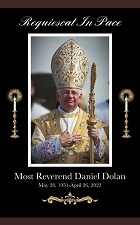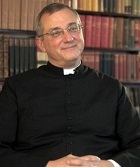09:45 O Lord, We Adore Thy Cross |
|
O Lord, We Adore Thy Cross "Of every tree of paradise thou shalt eat: But of the tree of knowledge of good and evil, thou shalt not eat. For in what day so ever thou shalt eat of it, thou shalt die the death." (GENESIS 2:15-17) Have they never read these words of Our Lord Jesus Christ about death? “There was a certain rich man, who was clothed in purple and fine linen: and feasted sumptuously every day. And there was a certain beggar named Lazarus, who lay at his gate, full of sores. Desiring to be filled with the crumbs that fell from the rich man's table, and no one did give him; moreover the dogs came and licked his sores. And it came to pass that the beggar died, and was carried by the Angels into Abraham‘s bosom. And the rich man also died: and he was buried in hell.” (St. Luke 16:19:22) Have they also never heard about or read St. Paul the Apostle’s words? "It is appointed unto men once to die, and, after this, the Judgment" (Hebrew 9:27)
The Third Sunday of Lent in the Byzantine Rite is called Sunday of the Adoration of the Cross and is dedicated to the adoration of the Holy Cross, the sign of Christ’s victory over Satan and human passions. In the year 2020 AD it was on March 23rd. "If any man will follow Me, let him deny himself, and take up his cross, and follow Me. For whosoever will save his life, shall lose it; and whosoever shall lose his life for My sake and the Gospel shall save it. For what shall it profit a man, it he gain the whole world, and suffer the loss of his soul? Or what shall a man give in exchange for his soul? For he that shall be ashamed of Me, and of My words in this adulterous and sinful generation: the Son of man also will be ashamed of him, when He shall come in the glory of His Father with the holy angels. And He said to them: Amen I say to you, that there are some of them that stand here who shall not taste death, till they see the Kingdom of God coming in power." (St. Mark 8:34-39) The Most Rev. Dr. MacEVILLY comments on this Gospel passage as follows: “The three great obstacles to our following Christ, and taking up our cross, are, the excessive love of life, and of its pleasures, and the aversion to suffer anything opposed to such pleasures. "The concupiscence of the flesh," the love of riches. "The concupiscence of the eyes," the desire of glory and honours. "The pride of life," (1 John ii. 16) which are the three great leading maxims of the world. In verse 35, Our Lord adduces an argument or motive to overcome or remove the first impediment, arising from the inordinate love of life and its pleasures; in verse 36 to remove the second obstacle, arising from the love of riches; and in verse 38, to remove the third obstacle, arising from love of honours (see Matt. x. 32, 33).” (AN EXPOSITION THE GOSPELS Consisting of AN ANALYSIS OF EACH CHAPTER AND OF A COMMENTARY CRITICAL, EXEGETICAL, DOCTRINAL, AND MORAL, BY HIS GRACE THE MOST REV. DR. MacEVILLY, ARCHBISHOP OF TUAM, FOURTH EDITION, REVISED AND CORRECTED, DUBLIN, M. H. GILL & SON, 50 UPPER O'CONNELL STR. NEW YORK: BENZIGER BROTHERS, 113 BROADWAY, 1898, THE GOSPEL OF ST. MATTHEW and ST. MARK, p. 641)
While man lives in the body on Earth, this Gospel is always relevant; especially now in this time of worldwide panic, sadness and fear. "For the sorrow that is according to God worketh penance steadfast unto salvation: but the sorrow of the world worketh death." (II TO THE CORINTHIANS 7:10)
If this is a seasonal pandemic (flu) caused by a new type of a virus, of course we should be cautious and take care of our own mortal bodies and the bodies of our neighbors since it is one of God’s Commandments. "Bad rulers are generally sent by God as a chastisement for the sins of the nation. If the monarch should be tyrannical, we must implore the help of God, and His help will be granted when the people forsake their evil doings. We are also to honor the ruler of our country. "Fear God. Honor the king" (1 Pet. ii. 17). A king is spoken of as "His Majesty," and a royal reception is prepared for him wherever he goes. We ought, moreover, to pray for our rulers. It is acceptable to God that prayers and supplications be made for all that are in a high station (1 Tim. ii). Besides prayer for our rulers brings a blessing on ourselves, for by it we obtain the passing of decrees beneficial to their people. At High Mass the priest prays for the sovereign ruler." (The Catechism Explained, AN EXHAUSTIVE EXPOSITION OF THE CHRISTIAN RELIGION, From the original of Rev. Francis Spirago, Professor of Theology, Edited by Rev. Richard F. Clarke, S.J. New York, Cincinnati, Chicago: BENZIGER BROTHERS, Printers to the Holy Apostolic See, 1899 Nihil Obstat: Thos. L. Kinkead, Censor Librorum, Imprimatur: + MICHAEL AUGUSTINE, Archbishop of New York. New York, August 8, 1899. p. 376). The Eastern Rite Church after each church service throughout the whole of Lent except Saturdays and Sundays sings the following anthem in honor of Christ’s Passion: O Jesus Christ, Thou Who hast suffered the Passion for our sake, have mercy on us (three times). Let us also not forget to ask for the intercession of all the Saints* and especially of the Blessed Virgin Mary, who stood under the Cross of Her Son until the end and with Her Motherly prayers alleviated His Great Suffering. Commemorating our most Holy, most Blessed, glorious Lady, the Mother of God and Ever-Virgin Mary, with all the Saints, let us commend ourselves, one another and our whole life to Christ, our Lord. (Divine Liturgy)
Fr. Valerii |
| Категорія: Articles in English | Переглядів: 726 | Додав: |

